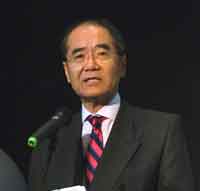Director-General outlines UNESCO’s response to Gaza crisis

- Copyright UNESCO/Niamh Burke
- UNESCO Director-General Koïchiro Matsuura
The Director-General of UNESCO, Koïchiro Matsuura has confirmed that six UNESCO projects - five focusing on education, one on the safety of journalists and freedom of expression - have been included in the United Nations Gaza Flash Appeal launched in Geneva on February 2nd by the Under-Secretary-General for Humanitarian Affairs and Emergency Relief Coordinator, John Holmes.
The UNESCO projects, totaling approximately three million U.S. dollars, were selected following a UNESCO assessment mission to Gaza on 1st and 2nd February 2009, headed by the UNESCO Chief of the Office for the Palestinian Territories, Louise Haxthausen, together with UNESCO education and culture programme specialists.
The Director-General told representatives of UNESCO Member States, late last week that the five educational projects “aim to help restore quality educational services at all levels, in particular in secondary and higher education, which are too often neglected in the humanitarian response.”
Reports show that seven schools in northern Gaza were completely destroyed during the fighting and that more than 150 primary schools were damaged. All schools in the territory were closed between 27 December and 24 January, causing over half a million learners from pre-school to university to miss classes.
All of Gaza’s 14 public and private universities are also reported to have been affected and the main building of the Islamic University was completely destroyed. The laboratories and libraries of several other universities have been destroyed and several learning institutions are affected by the death of students and teachers.
A sixth UNESCO project focuses on strengthening the safety and protection of journalists and enhancing press freedom in the Gaza Strip. It aims to increase the access to information through capacity building, the provision of protective equipment and the establishment of a professional support network. Increased awareness about the rights of the media, reporting and monitoring on the violations against press freedom, and psycho-social support and hotline for media professionals are expected to mitigate the deterioration of press freedom and of access to information in the Gaza Strip.
UNESCO has donated 16 protective vests, helmets and press signs to Palestinian media professionals to increase their safety and protection.
“In the present context of a humanitarian emergency, UNESCO’s priority concern is to assess, plan and deliver as ‘one’ in close cooperation with other UN agencies, funds and programmes, as well as with other non governmental humanitarian actors on the ground,” said the Director-General. “But clearly, there are major needs for long-term reconstruction that must be addressed as well,” he added.
In his presentation, Mr Matsuura noted that UNESCO’s rapid assessment mission to Gaza had taken place within the framework of the overall UN-led assessment effort. Its purpose was to contribute to UN efforts and provide data related to the state of the education system and cultural heritage sites in Gaza.
“Based on this assessment mission, UNESCO will refine its projects included in the UN Flash Appeal and start assisting the Palestinian Authority in drafting the Gaza Early Recovery and Reconstruction Plan,” Mr Matsuura explained. This Plan, focused on needs and priorities for long-term reconstruction, will be launched during an international donor conference in Cairo, Egypt, on 2nd March 2009.
During the meeting, the Director-General announced his decision to scale up UNESCO’s response capacity in Gaza and to establish a project antenna within the UNDP compound in Gaza City for the duration of the implementation of the projects identified. He also informed Member States that the Norwegian Refugee Council (NRC) had agreed to the rapid deployment of an education specialist to the UNESCO Office in Ramallah. Finally, Mr Matsuura announced the immediate release of a total of US$ 165,000 to commence operations in the affected areas.
“I very much hope Member States and donors will respond positively to this urgent demand for financial support so that we can help the people of Gaza at this time of great distress. Despite the political and operational constraints, this support will be crucial so that we can respond, in our fields of competence, to emergency and early recovery needs”, concluded the Director-General.
- 10-02-2009


